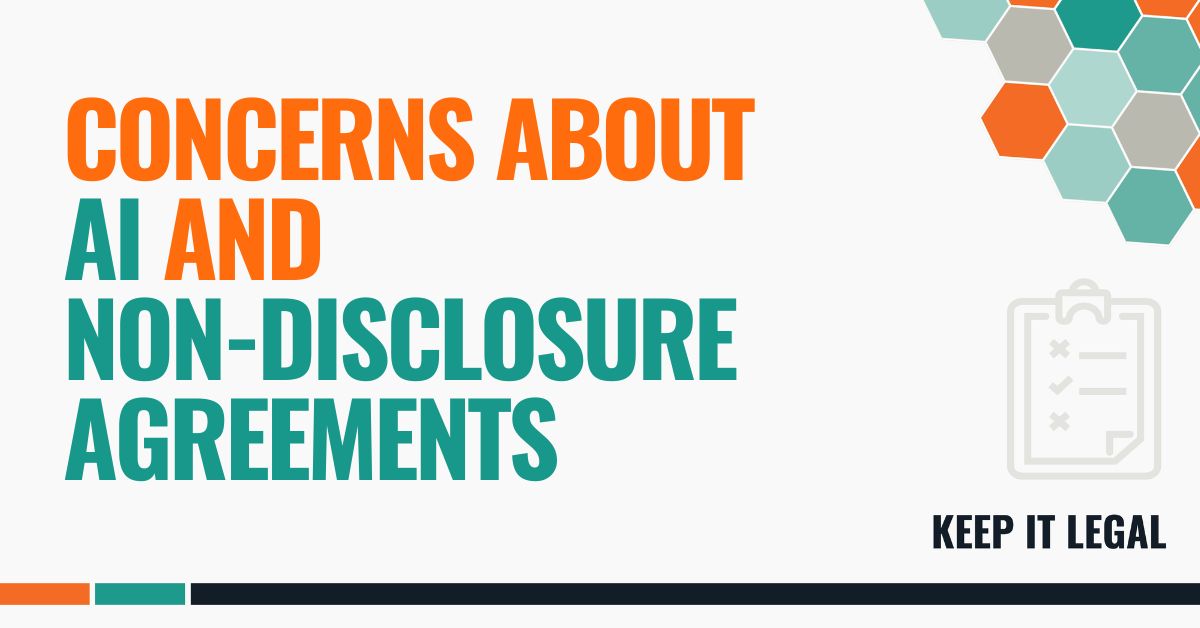This post marries two concepts: Non-Disclosure Agreements (NDAs) and Artificial Intelligence (AI). They may seem unrelated, but I’ve noticed an issue coming up lately that may have escaped the notice of many business owners.
The bottom line is that your business’ existing NDAs (and any contracts that include confidentiality provisions) may need to be revised to account for new developments in technology.
Imagine you own a marketing agency that provides tailored advertising solutions for your clients. You sign an NDA with a big client to work on a campaign for a new product launch. The NDA is standard and has not been updated to account for the complexities of new technology.
You use a popular cloud storage service, like Dropbox, to share files and information. You aren’t even aware that the cloud storage service also offers text and data mining features (akin to AI capabilities) to help businesses extract useful information from their stored files. While you didn’t actively opt for the text and data mining service, the cloud provider’s terms of service do mention that they reserve the right to scan files for offering custom features, including advertising options to the user.
This situation puts you at risk of violating the NDA. Your client’s confidential information is stored in a cloud service that reserves the right to scan and analyze files. In this example, you are exposing confidential information to a third party, thereby breaching your NDA obligations unknowingly.
NDAs: A Quick Recap
Before we delve into AI, let’s go over what an NDA is. A Non-Disclosure Agreement is a legally binding contract that prevents one party from sharing another’s confidential information. These agreements can protect a wide range of info, from your client lists to your business plan. They can be mutual, where both parties agree not to share each other’s information, or one-way, which is primarily aimed at safeguarding only one party’s secrets.
For more on NDAs, check out this post from a few years ago.
Artificial Intelligence and Business
AI technologies like language models, chatbots, and data analytics tools are becoming indispensable in business. ChatGPT, for example, is a language model that can simulate human-like conversations, draft emails, and even write code snippets. But it’s important to recognize that ChatGPT is not the only AI tool out there. There are various AI and machine learning algorithms developed by different companies for a multitude of tasks.
The Collision Course: NDAs and AI
Now, why should you, as a business owner, care about how NDAs intersect with AI?
Most AI platforms are operated by third-party vendors. Even though they often claim to anonymize data sent for training their models, sharing any confidential information with them is akin to sharing it with a complete stranger you meet on an airplane. You are potentially breaching the NDA by exposing confidential information to a third party. If you are sharing confidential information with any other person or business, you should make sure that your NDA explicitly states that none of that confidential information can be input into an AI program without your consent.
So What Should You Do?
- Check Existing Agreements: Review your current NDAs and update them to address the use of AI tools. If you’re starting fresh, make sure your new NDAs cover this ground.
- Consult your Legal Team: Always consult with your legal counsel to understand the nuances and risks involved in using AI in different departments of your business.
- Educate Employees: Regularly train your employees about the confidentiality clauses in their contracts and the implications of using third-party services like AI platforms.
- Tech Safeguards: Employ end-to-end encryption for sensitive data and limit AI tool access only to authorized personnel.
- Regular Audits: Regularly check the usage of AI tools in your organization. Monitor the conversations and tasks they’re being used for.
- Client Approvals: If you’re considering using AI tools for client work that involves confidential information, seek their explicit, written approval beforehand.
- No-Go Zones: Identify the departments and kinds of information that are too sensitive to be used with third-party AI tools and enforce a blanket ban on their use in these areas.
Final Thoughts
While AI can offer exceptional benefits for business efficiency, it’s crucial to navigate its use carefully to avoid breaching NDAs and putting your company at risk. NDAs are not just pieces of paper; they’re legally binding contracts that can lead to penalties if breached. Ignoring the risks is not an option unless you’re prepared to face the consequences.
If you need help reviewing your NDAs or understanding how AI might impact your legal obligations, feel free to be in touch.


